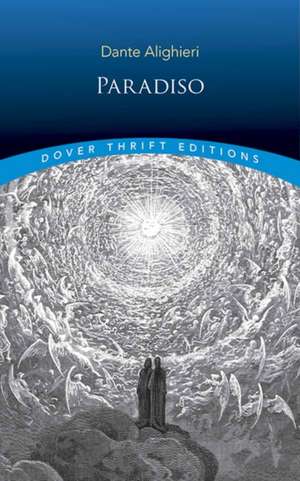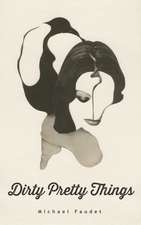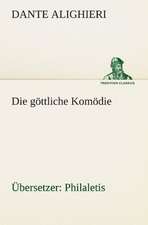Paradiso: Dover Thrift Editions
Autor Dante Alighieri Traducere de Henry Wadsworth Longfellowen Limba Engleză Paperback – 29 iun 2017
Guided by Beatrice, the incarnation of beatific love, Dante undergoes an intellectual journey from doubt to faith. Beatrice instructs the poet in scholastic theology as they pass through the nine spheres of Paradise to the Empyrean, a realm of pure light in which the redeemed experience the bliss of God's immediate presence. This edition features the renowned translation by American poet Henry Wadsworth Longfellow and serves as a companion volume to the Dover editions of Inferno and Purgatorio.
| Toate formatele și edițiile | Preț | Express |
|---|---|---|
| Paperback (4) | 48.03 lei 3-5 săpt. | |
| Signet Classics – 30 sep 2009 | 48.03 lei 3-5 săpt. | |
| CREATESPACE – | 48.27 lei 3-5 săpt. | |
| CREATESPACE – | 68.92 lei 3-5 săpt. | |
| Anchor Books – 31 aug 2008 | 133.61 lei 3-5 săpt. | |
| Hardback (1) | 199.52 lei 6-8 săpt. | |
| Aegypan Press – 31 iul 2008 | 199.52 lei 6-8 săpt. |
Din seria Dover Thrift Editions
-
 Preț: 39.39 lei
Preț: 39.39 lei -
 Preț: 67.45 lei
Preț: 67.45 lei -
 Preț: 25.15 lei
Preț: 25.15 lei -
 Preț: 52.41 lei
Preț: 52.41 lei -
 Preț: 25.77 lei
Preț: 25.77 lei - 36%
 Preț: 61.44 lei
Preț: 61.44 lei - 16%
 Preț: 21.50 lei
Preț: 21.50 lei -
 Preț: 43.52 lei
Preț: 43.52 lei - 16%
 Preț: 21.16 lei
Preț: 21.16 lei -
 Preț: 33.19 lei
Preț: 33.19 lei - 16%
 Preț: 66.56 lei
Preț: 66.56 lei -
 Preț: 34.65 lei
Preț: 34.65 lei - 17%
 Preț: 31.67 lei
Preț: 31.67 lei -
 Preț: 55.06 lei
Preț: 55.06 lei -
 Preț: 29.49 lei
Preț: 29.49 lei -
 Preț: 49.32 lei
Preț: 49.32 lei -
 Preț: 40.20 lei
Preț: 40.20 lei -
 Preț: 40.44 lei
Preț: 40.44 lei - 17%
 Preț: 18.21 lei
Preț: 18.21 lei - 55%
 Preț: 16.97 lei
Preț: 16.97 lei -
 Preț: 37.31 lei
Preț: 37.31 lei - 20%
 Preț: 16.43 lei
Preț: 16.43 lei - 16%
 Preț: 53.42 lei
Preț: 53.42 lei -
 Preț: 32.78 lei
Preț: 32.78 lei - 14%
 Preț: 27.66 lei
Preț: 27.66 lei - 17%
 Preț: 31.13 lei
Preț: 31.13 lei - 48%
 Preț: 16.17 lei
Preț: 16.17 lei -
 Preț: 56.50 lei
Preț: 56.50 lei -
 Preț: 30.53 lei
Preț: 30.53 lei -
 Preț: 38.35 lei
Preț: 38.35 lei - 15%
 Preț: 40.71 lei
Preț: 40.71 lei - 13%
 Preț: 28.46 lei
Preț: 28.46 lei -
 Preț: 76.91 lei
Preț: 76.91 lei -
 Preț: 83.12 lei
Preț: 83.12 lei -
 Preț: 27.45 lei
Preț: 27.45 lei - 13%
 Preț: 34.43 lei
Preț: 34.43 lei -
 Preț: 170.50 lei
Preț: 170.50 lei -
 Preț: 44.94 lei
Preț: 44.94 lei -
 Preț: 30.53 lei
Preț: 30.53 lei -
 Preț: 39.62 lei
Preț: 39.62 lei -
 Preț: 26.81 lei
Preț: 26.81 lei -
 Preț: 27.45 lei
Preț: 27.45 lei -
 Preț: 34.87 lei
Preț: 34.87 lei -
 Preț: 32.03 lei
Preț: 32.03 lei - 17%
 Preț: 18.15 lei
Preț: 18.15 lei -
 Preț: 28.44 lei
Preț: 28.44 lei -
 Preț: 56.93 lei
Preț: 56.93 lei - 17%
 Preț: 20.71 lei
Preț: 20.71 lei -
 Preț: 25.35 lei
Preț: 25.35 lei - 16%
 Preț: 66.10 lei
Preț: 66.10 lei
Preț: 32.53 lei
Nou
Puncte Express: 49
Preț estimativ în valută:
6.22€ • 6.66$ • 5.19£
6.22€ • 6.66$ • 5.19£
Cartea se retipărește
Doresc să fiu notificat când acest titlu va fi disponibil:
Se trimite...
Preluare comenzi: 021 569.72.76
Specificații
ISBN-13: 9780486815343
ISBN-10: 048681534X
Pagini: 304
Dimensiuni: 127 x 203 x 20 mm
Greutate: 0.18 kg
Editura: Dover Publications
Seria Dover Thrift Editions
ISBN-10: 048681534X
Pagini: 304
Dimensiuni: 127 x 203 x 20 mm
Greutate: 0.18 kg
Editura: Dover Publications
Seria Dover Thrift Editions
Notă biografică
Durante degli Alighieri (1265 - 1321), was a major Italian poet of the Late Middle Ages. His Divine Comedy, originally called Comedìa and later christened Divina by Boccaccio, is widely considered the greatest literary work composed in the Italian language and a masterpiece of world literature. In the late Middle Ages, the overwhelming majority of poetry was written in Latin and therefore accessible only to affluent and educated audiences. In De vulgari eloquentia (On Eloquence in the Vernacular), however, Dante defended use of the vernacular in literature. He himself would even write in the Tuscan dialect for works such as The New Life (1295) and the aforementioned Divine Comedy; this choice, although highly unorthodox, set a hugely important precedent that later Italian writers such as Petrarch and Boccaccio would follow. As a result, Dante played an instrumental role in establishing the national language of Italy.
Extras
PARADISO I
OUTLINE
1-12 -proem: looking back at the completed journey and the promise to narrate the rest of its course
13-36 -invocation (fifth in the poem): the aid of "Apollo"
13-21 -invocation proper
22-36 -result of such inspiration; justification for it
37-60 -the narrative begins: Dante still in earthly paradise
37-42 -the constellation Aries
43-48 -noon: Dante looking as Beatrice looks into the sun
49-54 -simile: the sun in her eyes and reflecting rays
55-60 -Dante can look directly at the sun
61-81 -the ascent toward the Moon
61-63 -rising, Dante seems to see a second sun above him
64-66 -he looks back to see the stars reflected in her eyes
67-72 -simile: Glaucus and Dante's own "transhumanation"
73-75 -the poet cannot say whether he ascended in body
76-81 -reaching the sublunary ring of fire: son et lumiere
82-141 -Dante's questions and Beatrice's responses
82-93 -the first question: where is he? and the response
94-99 -the second: how can he pass through air and fire?
100-126 -response: the upward inclination of all things
127-135 -response: how things diverge from their true goal
136-141 -response: but not Dante, now freed from sin
142 -coda: Beatrice looks back up.
PARADISO I
La gloria di colui che tutto move
per l'universo penetra, e risplende
3 in una parte piu e meno altrove.
Nel ciel che piu de la sua luce prende
fu' io, e vidi cose che ridire
6 ne sa ne puo chi di la su discende;
perche appressando se al suo disire,
nostro intelletto si profonda tanto,
9 che dietro la memoria non puo ire.
Veramente quant' io del regno santo
ne la mia mente potei far tesoro,
12 sara ora materia del mio canto.
O buono Appollo, a l'ultimo lavoro
fammi del tuo valor si fatto vaso,
15 come dimandi a dar l'amato alloro.
Infino a qui l'un giogo di Parnaso
assai mi fu; ma or con amendue
18 m'e uopo intrar ne l'aringo rimaso.
Entra nel petto mio, e spira tue
si come quando Marsia traesti
21 de la vagina de le membra sue.
O divina virtu, se mi ti presti
tanto che l'ombra del beato regno
24 segnata nel mio capo io manifesti,
vedra'mi al pie del tuo diletto legno
venire, e coronarmi de le foglie
27 che la materia e tu mi farai degno.
The glory of Him who moves all things
pervades the universe and shines
3 in one part more and in another less.
I was in that heaven which receives
more of His light. He who comes down from there
6 can neither know nor tell what he has seen,
for, drawing near to its desire,
so deeply is our intellect immersed
9 that memory cannot follow after it.
Nevertheless, as much of the holy kingdom
as I could store as treasure in my mind
12 shall now become the subject of my song.
O good Apollo, for this last labor
make me a vessel worthy
15 of the gift of your beloved laurel.
Up to this point, one peak of Mount Parnassus
has been enough, but now I need them both
18 in order to confront the struggle that awaits.
Enter my breast and breathe in me
as when you drew out Marsyas,
21 out from the sheathing of his limbs.
O holy Power, if you but lend me of yourself
enough that I may show the merest shadow
24 of the blessed kingdom stamped within my mind,
you shall find me at the foot of your beloved tree,
crowning myself with the very leaves
27 of which my theme and you will make me worthy.
Si rade volte, padre, se ne coglie
per triunfare o cesare o poeta,
30 colpa e vergogna de l'umane voglie,
che parturir letizia in su la lieta
delfica deita dovria la fronda
33 peneia, quando alcun di se asseta.
Poca favilla gran fiamma seconda:
forse di retro a me con miglior voci
36 si preghera perche Cirra risponda.
Surge ai mortali per diverse foci
la lucerna del mondo; ma da quella
39 che quattro cerchi giugne con tre croci,
con miglior corso e con migliore stella
esce congiunta, e la mondana cera
42 piu a suo modo tempera e suggella.
Fatto avea di la mane e di qua sera
tal foce, e quasi tutto era la bianco
45 quello emisperio, e l'altra parte nera,
quando Beatrice in sul sinistro fianco
vidi rivolta e riguardar nel sole:
48 aguglia si non li s'affisse unquanco.
E si come secondo raggio suole
uscir del primo e risalire in suso,
51 pur come pelegrin che tornar vuole,
cosi de l'atto suo, per li occhi infuso
ne l'imagine mia, il mio si fece,
54 e fissi li occhi al sole oltre nostr' uso.
Molto e licito la, che qui non lece
a le nostre virtu, merce del loco
57 fatto per proprio de l'umana spece.
So rarely, father, are they gathered
to mark the triumph of a Caesar or a poet--
30 fault and shame of human wishes--
that anyone's even longing for them,
those leaves on the Peneian bough, should make
33 the joyous Delphic god give birth to joy.
Great fire leaps from the smallest spark.
Perhaps, in my wake, prayer will be shaped
36 with better words so Cyrrha may respond.
The lamp of the world rises on us mortals
at different points. But, by the one that joins
39 four circles with three crossings, it comes forth
on a better course and in conjunction
with a better sign. Then it tempers and imprints
42 the wax of the world more to its own fashion.
Its rising near that point had brought out morning there
and evening here, and that hemisphere
45 was arrayed in light, this one in darkness,
when I saw that Beatrice had turned toward her left
and now was staring at the sun--
48 never had eagle so fixed his gaze on it.
And, as a second ray will issue from the first
and rise again up to its source,
51 even as a pilgrim longs to go back home,
so her gaze, pouring through my eyes
on my imagination, made itself my own, and I,
54 against our practice, set my eyes upon the sun.
Much that our powers here cannot sustain is there
allowed by virtue of the nature of the place
57 created as the dwelling fit for man.
Io nol soffersi molto, ne si poco,
ch'io nol vedessi sfavillar dintorno,
60 com' ferro che bogliente esce del foco;
e di subito parve giorno a giorno
essere aggiunto, come quei che puote
63 avesse il ciel d'un altro sole addorno.
Beatrice tutta ne l'etterne rote
fissa con li occhi stava; e io in lei
66 le luci fissi, di la su rimote.
Nel suo aspetto tal dentro mi fei,
qual si fe Glauco nel gustar de l'erba
69 che 'l fe consorto in mar de li altri dei.
Trasumanar significar per verba
non si poria; pero l'essemplo basti
72 a cui esperienza grazia serba.
S'i' era sol di me quel che creasti
novellamente, amor che 'l ciel governi,
75 tu 'l sai, che col tuo lume mi levasti.
Quando la rota che tu sempiterni
desiderato, a se mi fece atteso
78 con l'armonia che temperi e discerni,
parvemi tanto allor del cielo acceso
de la fiamma del sol, che pioggia o fiume
81 lago non fece alcun tanto disteso.
La novita del suono e 'l grande lume
di lor cagion m'accesero un disio
84 mai non sentito di cotanto acume.
Ond' ella, che vedea me si com' io,
a quietarmi l'animo commosso,
87 pria ch'io a dimandar, la bocca aprio
I could not bear it long, yet not so brief a time
as not to see it sparking everywhere,
60 like liquid iron flowing from the fire.
Suddenly it seemed a day was added to that day,
as if the One who has the power
63 had adorned the heavens with a second sun.
Beatrice had fixed her eyes
upon the eternal wheels and I now fixed
66 my sight on her, withdrawing it from above.
As I gazed on her, I was changed within,
as Glaucus was on tasting of the grass
69 that made him consort of the gods in the sea.
To soar beyond the human cannot be described
in words. Let the example be enough to one
72 for whom grace holds this experience in store.
Whether I was there in that part only which you
created last is known to you alone, O Love who rule
75 the heavens and drew me up there with your light.
When the heavens you made eternal,
wheeling in desire, caught my attention
78 with the harmony you temper and attune,
then so much of the sky seemed set on fire
by the flaming sun that neither rain nor river
81 ever fed a lake so vast.
The newness of the sound and the bright light
lit in me such keen desire to know their cause
84 as I had never with such sharpness felt before.
And she, who knew me as I knew myself,
to calm my agitated mind
87 before I even had begun to speak, parted her lips
e comincio: "Tu stesso ti fai grosso
col falso imaginar, si che non vedi
90 cio che vedresti se l'avessi scosso.
Tu non se' in terra, s“ come tu credi;
ma folgore, fuggendo il proprio sito,
93 non corse come tu ch'ad esso riedi."
S'io fui del primo dubbio disvestito
per le sorrise parolette brevi,
96 dentro ad un nuovo piu fu' inretito
e dissi: "Gia contento requievi
di grande ammirazion; ma ora ammiro
99 com' io trascenda questi corpi levi."
Ond' ella, appresso d'un pio sospiro,
li occhi drizzo ver' me con quel sembiante
102 che madre fa sovra figlio deliro,
e comincio: "Le cose tutte quante
hanno ordine tra loro, e questo e forma
105 che l'universo a Dio fa simigliante.
Qui veggion l'alte creature l'orma
de l'etterno valore, il qual e fine
108 al quale e fatta la toccata norma.
Ne l'ordine ch'io dico sono accline
tutte nature, per diverse sorti,
111 pi? al principio loro e men vicine;
onde si muovono a diversi porti
per lo gran mar de l'essere, e ciascuna
114 con istinto a lei dato che la porti.
Questi ne porta il foco inver' la luna;
questi ne' cor mortali e permotore;
117 questi la terra in se stringe e aduna;
and said: 'You make yourself dull-witted
with false notions, so that you cannot see
90 what you would understand, had you but cast them off.
'You are not still on earth, as you believe.
Indeed, lightning darting from its source
93 never sped as fast as you return to yours.'
If I was stripped of my earlier confusion
by her brief and smiling words,
96 I was the more entangled in new doubt
and said: 'I was content to be released
from my amazement, but now I am amazed
99 that I can glide through these light bodies.'
Then she, having sighed with pity,
bent her eyes on me with just that look
102 a mother casts on her delirious child,
and said: 'All things created have an order
in themselves, and this begets the form
105 that lets the universe resemble God.
'Here the higher creatures see the imprint
of the eternal Worth, the end
108 for which that pattern was itself set forth.
'In that order, all natures have their bent
according to their different destinies,
111 whether nearer to their source or farther from it.
'They move, therefore, toward different harbors
upon the vastness of the sea of being,
114 each imbued with an instinct that impels it on its course.
'This instinct carries fire toward the moon,
this is the moving force in mortal hearts,
117 this binds the earth to earth and makes it one.
ne pur le creature che son fore
d'intelligenza quest' arco saetta,
120 ma quelle c'hanno intelletto e amore.
La provedenza, che cotanto assetta,
del suo lume fa 'l ciel sempre quieto
123 nel qual si volge quel c'ha maggior fretta;
e ora li, come a sito decreto,
cen porta la virtu di quella corda
126 che cio che scocca drizza in segno lieto.
Vero e che, come forma non s'accorda
molte fiate a l'intenzion de l'arte,
129 perch' a risponder la materia e sorda,
cosi da questo corso si diparte
talor la creatura, c'ha podere
132 di piegar, cosi pinta, in altra parte;
e si come veder si puo cadere
foco di nube, si l'impeto primo
135 l'atterra torto da falso piacere.
Non dei piu ammirar, se bene stimo,
lo tuo salir, se non come d'un rivo
138 se d'alto monte scende giuso ad imo.
Maraviglia sarebbe in te se, privo
d'impedimento, giu ti fossi assiso,
com' a terra quiete in foco vivo."
142 Quinci rivolse inver' lo cielo il viso.
'This bow impels not just created things
that lack intelligence, but also those
120 that have both intellect and love.
'Providence, which regulates all this,
makes with its light forever calm the heaven
123 that contains the one that whirls with greatest speed,
'and there now, as to a place appointed,
the power of that bowstring bears us,
126 aimed, as is all it shoots, at a joyful target.
'It is true that as a work will often fail
to correspond to its intended form, its matter
129 deaf and unresponsive to the craftsman's plan,
'so sometimes a creature, having the capacity
to swerve, will, thus impelled, head off another way,
132 in deviation from the better course
'and, just as sometimes we see fire
falling from a cloud, just so the primal impulse,
135 diverted by false pleasure, turns toward earth.
'If I am correct, you should no more wonder
at your rising than at a stream's descent
138 from a mountain's peak down to its foot.
'It would be as astounding if you, set free
from every hindrance, had remained below,
as if on earth a living flame held still.'
142 Then she turned her face up to the heavens.
PARADISO I
1-36. Dante clearly offers these verses as an introduction to the third and final cantica as a whole. So much is dealt with in them, and in precisely such a way as to set Paradiso off from the rest of the poem, that it is perhaps worth considering them as a unit before attempting to come to grips with particular lines. One burden of these remarks (and of the specific glosses that follow them) is that Dante is once again (see, e.g., Purg. XXIV.52-54) playing a dangerous game as he addresses his role as poet. He presents himself, if in hidden ways (in modern political parlance, he "preserves deniability"), as being inspired by God to write this part of the poem (a barely hidden claim in the first two canticles as well). At the same time he allows us to believe, if we are uncomfortable with that claim here, that he is only doing what all poets do, invoking deities for poetic inspiration as has been conventional since Homer's time.
OUTLINE
1-12 -proem: looking back at the completed journey and the promise to narrate the rest of its course
13-36 -invocation (fifth in the poem): the aid of "Apollo"
13-21 -invocation proper
22-36 -result of such inspiration; justification for it
37-60 -the narrative begins: Dante still in earthly paradise
37-42 -the constellation Aries
43-48 -noon: Dante looking as Beatrice looks into the sun
49-54 -simile: the sun in her eyes and reflecting rays
55-60 -Dante can look directly at the sun
61-81 -the ascent toward the Moon
61-63 -rising, Dante seems to see a second sun above him
64-66 -he looks back to see the stars reflected in her eyes
67-72 -simile: Glaucus and Dante's own "transhumanation"
73-75 -the poet cannot say whether he ascended in body
76-81 -reaching the sublunary ring of fire: son et lumiere
82-141 -Dante's questions and Beatrice's responses
82-93 -the first question: where is he? and the response
94-99 -the second: how can he pass through air and fire?
100-126 -response: the upward inclination of all things
127-135 -response: how things diverge from their true goal
136-141 -response: but not Dante, now freed from sin
142 -coda: Beatrice looks back up.
PARADISO I
La gloria di colui che tutto move
per l'universo penetra, e risplende
3 in una parte piu e meno altrove.
Nel ciel che piu de la sua luce prende
fu' io, e vidi cose che ridire
6 ne sa ne puo chi di la su discende;
perche appressando se al suo disire,
nostro intelletto si profonda tanto,
9 che dietro la memoria non puo ire.
Veramente quant' io del regno santo
ne la mia mente potei far tesoro,
12 sara ora materia del mio canto.
O buono Appollo, a l'ultimo lavoro
fammi del tuo valor si fatto vaso,
15 come dimandi a dar l'amato alloro.
Infino a qui l'un giogo di Parnaso
assai mi fu; ma or con amendue
18 m'e uopo intrar ne l'aringo rimaso.
Entra nel petto mio, e spira tue
si come quando Marsia traesti
21 de la vagina de le membra sue.
O divina virtu, se mi ti presti
tanto che l'ombra del beato regno
24 segnata nel mio capo io manifesti,
vedra'mi al pie del tuo diletto legno
venire, e coronarmi de le foglie
27 che la materia e tu mi farai degno.
The glory of Him who moves all things
pervades the universe and shines
3 in one part more and in another less.
I was in that heaven which receives
more of His light. He who comes down from there
6 can neither know nor tell what he has seen,
for, drawing near to its desire,
so deeply is our intellect immersed
9 that memory cannot follow after it.
Nevertheless, as much of the holy kingdom
as I could store as treasure in my mind
12 shall now become the subject of my song.
O good Apollo, for this last labor
make me a vessel worthy
15 of the gift of your beloved laurel.
Up to this point, one peak of Mount Parnassus
has been enough, but now I need them both
18 in order to confront the struggle that awaits.
Enter my breast and breathe in me
as when you drew out Marsyas,
21 out from the sheathing of his limbs.
O holy Power, if you but lend me of yourself
enough that I may show the merest shadow
24 of the blessed kingdom stamped within my mind,
you shall find me at the foot of your beloved tree,
crowning myself with the very leaves
27 of which my theme and you will make me worthy.
Si rade volte, padre, se ne coglie
per triunfare o cesare o poeta,
30 colpa e vergogna de l'umane voglie,
che parturir letizia in su la lieta
delfica deita dovria la fronda
33 peneia, quando alcun di se asseta.
Poca favilla gran fiamma seconda:
forse di retro a me con miglior voci
36 si preghera perche Cirra risponda.
Surge ai mortali per diverse foci
la lucerna del mondo; ma da quella
39 che quattro cerchi giugne con tre croci,
con miglior corso e con migliore stella
esce congiunta, e la mondana cera
42 piu a suo modo tempera e suggella.
Fatto avea di la mane e di qua sera
tal foce, e quasi tutto era la bianco
45 quello emisperio, e l'altra parte nera,
quando Beatrice in sul sinistro fianco
vidi rivolta e riguardar nel sole:
48 aguglia si non li s'affisse unquanco.
E si come secondo raggio suole
uscir del primo e risalire in suso,
51 pur come pelegrin che tornar vuole,
cosi de l'atto suo, per li occhi infuso
ne l'imagine mia, il mio si fece,
54 e fissi li occhi al sole oltre nostr' uso.
Molto e licito la, che qui non lece
a le nostre virtu, merce del loco
57 fatto per proprio de l'umana spece.
So rarely, father, are they gathered
to mark the triumph of a Caesar or a poet--
30 fault and shame of human wishes--
that anyone's even longing for them,
those leaves on the Peneian bough, should make
33 the joyous Delphic god give birth to joy.
Great fire leaps from the smallest spark.
Perhaps, in my wake, prayer will be shaped
36 with better words so Cyrrha may respond.
The lamp of the world rises on us mortals
at different points. But, by the one that joins
39 four circles with three crossings, it comes forth
on a better course and in conjunction
with a better sign. Then it tempers and imprints
42 the wax of the world more to its own fashion.
Its rising near that point had brought out morning there
and evening here, and that hemisphere
45 was arrayed in light, this one in darkness,
when I saw that Beatrice had turned toward her left
and now was staring at the sun--
48 never had eagle so fixed his gaze on it.
And, as a second ray will issue from the first
and rise again up to its source,
51 even as a pilgrim longs to go back home,
so her gaze, pouring through my eyes
on my imagination, made itself my own, and I,
54 against our practice, set my eyes upon the sun.
Much that our powers here cannot sustain is there
allowed by virtue of the nature of the place
57 created as the dwelling fit for man.
Io nol soffersi molto, ne si poco,
ch'io nol vedessi sfavillar dintorno,
60 com' ferro che bogliente esce del foco;
e di subito parve giorno a giorno
essere aggiunto, come quei che puote
63 avesse il ciel d'un altro sole addorno.
Beatrice tutta ne l'etterne rote
fissa con li occhi stava; e io in lei
66 le luci fissi, di la su rimote.
Nel suo aspetto tal dentro mi fei,
qual si fe Glauco nel gustar de l'erba
69 che 'l fe consorto in mar de li altri dei.
Trasumanar significar per verba
non si poria; pero l'essemplo basti
72 a cui esperienza grazia serba.
S'i' era sol di me quel che creasti
novellamente, amor che 'l ciel governi,
75 tu 'l sai, che col tuo lume mi levasti.
Quando la rota che tu sempiterni
desiderato, a se mi fece atteso
78 con l'armonia che temperi e discerni,
parvemi tanto allor del cielo acceso
de la fiamma del sol, che pioggia o fiume
81 lago non fece alcun tanto disteso.
La novita del suono e 'l grande lume
di lor cagion m'accesero un disio
84 mai non sentito di cotanto acume.
Ond' ella, che vedea me si com' io,
a quietarmi l'animo commosso,
87 pria ch'io a dimandar, la bocca aprio
I could not bear it long, yet not so brief a time
as not to see it sparking everywhere,
60 like liquid iron flowing from the fire.
Suddenly it seemed a day was added to that day,
as if the One who has the power
63 had adorned the heavens with a second sun.
Beatrice had fixed her eyes
upon the eternal wheels and I now fixed
66 my sight on her, withdrawing it from above.
As I gazed on her, I was changed within,
as Glaucus was on tasting of the grass
69 that made him consort of the gods in the sea.
To soar beyond the human cannot be described
in words. Let the example be enough to one
72 for whom grace holds this experience in store.
Whether I was there in that part only which you
created last is known to you alone, O Love who rule
75 the heavens and drew me up there with your light.
When the heavens you made eternal,
wheeling in desire, caught my attention
78 with the harmony you temper and attune,
then so much of the sky seemed set on fire
by the flaming sun that neither rain nor river
81 ever fed a lake so vast.
The newness of the sound and the bright light
lit in me such keen desire to know their cause
84 as I had never with such sharpness felt before.
And she, who knew me as I knew myself,
to calm my agitated mind
87 before I even had begun to speak, parted her lips
e comincio: "Tu stesso ti fai grosso
col falso imaginar, si che non vedi
90 cio che vedresti se l'avessi scosso.
Tu non se' in terra, s“ come tu credi;
ma folgore, fuggendo il proprio sito,
93 non corse come tu ch'ad esso riedi."
S'io fui del primo dubbio disvestito
per le sorrise parolette brevi,
96 dentro ad un nuovo piu fu' inretito
e dissi: "Gia contento requievi
di grande ammirazion; ma ora ammiro
99 com' io trascenda questi corpi levi."
Ond' ella, appresso d'un pio sospiro,
li occhi drizzo ver' me con quel sembiante
102 che madre fa sovra figlio deliro,
e comincio: "Le cose tutte quante
hanno ordine tra loro, e questo e forma
105 che l'universo a Dio fa simigliante.
Qui veggion l'alte creature l'orma
de l'etterno valore, il qual e fine
108 al quale e fatta la toccata norma.
Ne l'ordine ch'io dico sono accline
tutte nature, per diverse sorti,
111 pi? al principio loro e men vicine;
onde si muovono a diversi porti
per lo gran mar de l'essere, e ciascuna
114 con istinto a lei dato che la porti.
Questi ne porta il foco inver' la luna;
questi ne' cor mortali e permotore;
117 questi la terra in se stringe e aduna;
and said: 'You make yourself dull-witted
with false notions, so that you cannot see
90 what you would understand, had you but cast them off.
'You are not still on earth, as you believe.
Indeed, lightning darting from its source
93 never sped as fast as you return to yours.'
If I was stripped of my earlier confusion
by her brief and smiling words,
96 I was the more entangled in new doubt
and said: 'I was content to be released
from my amazement, but now I am amazed
99 that I can glide through these light bodies.'
Then she, having sighed with pity,
bent her eyes on me with just that look
102 a mother casts on her delirious child,
and said: 'All things created have an order
in themselves, and this begets the form
105 that lets the universe resemble God.
'Here the higher creatures see the imprint
of the eternal Worth, the end
108 for which that pattern was itself set forth.
'In that order, all natures have their bent
according to their different destinies,
111 whether nearer to their source or farther from it.
'They move, therefore, toward different harbors
upon the vastness of the sea of being,
114 each imbued with an instinct that impels it on its course.
'This instinct carries fire toward the moon,
this is the moving force in mortal hearts,
117 this binds the earth to earth and makes it one.
ne pur le creature che son fore
d'intelligenza quest' arco saetta,
120 ma quelle c'hanno intelletto e amore.
La provedenza, che cotanto assetta,
del suo lume fa 'l ciel sempre quieto
123 nel qual si volge quel c'ha maggior fretta;
e ora li, come a sito decreto,
cen porta la virtu di quella corda
126 che cio che scocca drizza in segno lieto.
Vero e che, come forma non s'accorda
molte fiate a l'intenzion de l'arte,
129 perch' a risponder la materia e sorda,
cosi da questo corso si diparte
talor la creatura, c'ha podere
132 di piegar, cosi pinta, in altra parte;
e si come veder si puo cadere
foco di nube, si l'impeto primo
135 l'atterra torto da falso piacere.
Non dei piu ammirar, se bene stimo,
lo tuo salir, se non come d'un rivo
138 se d'alto monte scende giuso ad imo.
Maraviglia sarebbe in te se, privo
d'impedimento, giu ti fossi assiso,
com' a terra quiete in foco vivo."
142 Quinci rivolse inver' lo cielo il viso.
'This bow impels not just created things
that lack intelligence, but also those
120 that have both intellect and love.
'Providence, which regulates all this,
makes with its light forever calm the heaven
123 that contains the one that whirls with greatest speed,
'and there now, as to a place appointed,
the power of that bowstring bears us,
126 aimed, as is all it shoots, at a joyful target.
'It is true that as a work will often fail
to correspond to its intended form, its matter
129 deaf and unresponsive to the craftsman's plan,
'so sometimes a creature, having the capacity
to swerve, will, thus impelled, head off another way,
132 in deviation from the better course
'and, just as sometimes we see fire
falling from a cloud, just so the primal impulse,
135 diverted by false pleasure, turns toward earth.
'If I am correct, you should no more wonder
at your rising than at a stream's descent
138 from a mountain's peak down to its foot.
'It would be as astounding if you, set free
from every hindrance, had remained below,
as if on earth a living flame held still.'
142 Then she turned her face up to the heavens.
PARADISO I
1-36. Dante clearly offers these verses as an introduction to the third and final cantica as a whole. So much is dealt with in them, and in precisely such a way as to set Paradiso off from the rest of the poem, that it is perhaps worth considering them as a unit before attempting to come to grips with particular lines. One burden of these remarks (and of the specific glosses that follow them) is that Dante is once again (see, e.g., Purg. XXIV.52-54) playing a dangerous game as he addresses his role as poet. He presents himself, if in hidden ways (in modern political parlance, he "preserves deniability"), as being inspired by God to write this part of the poem (a barely hidden claim in the first two canticles as well). At the same time he allows us to believe, if we are uncomfortable with that claim here, that he is only doing what all poets do, invoking deities for poetic inspiration as has been conventional since Homer's time.
Recenzii
“A beautiful translation of the astonishing fourteenth-century poem. . . . The best on the market. . . . If you haven't read the Divine Comedy now is the time.”
—The New Yorker
“Paradiso . . . contains some of the most exhilarating poetry ever written. . . . Robert Hollander is one of the pre-eminent Dante scholars of our time.”
—The New York Times
“For our time and for an incalculable future the Hollander translation of The Divine Comedy will be the one used by serious readers. . . . Splendid as this new translation is, the endlessly valuable notes are what make this edition supplant all others.”
—National Review
“The Hollanders' version is supple and clear, a triumph.”
—The Los Angeles Times
“Very likely the most enduring, both as a literary achievement and for its commentaries.”
—Atlantic Montly
—The New Yorker
“Paradiso . . . contains some of the most exhilarating poetry ever written. . . . Robert Hollander is one of the pre-eminent Dante scholars of our time.”
—The New York Times
“For our time and for an incalculable future the Hollander translation of The Divine Comedy will be the one used by serious readers. . . . Splendid as this new translation is, the endlessly valuable notes are what make this edition supplant all others.”
—National Review
“The Hollanders' version is supple and clear, a triumph.”
—The Los Angeles Times
“Very likely the most enduring, both as a literary achievement and for its commentaries.”
—Atlantic Montly























